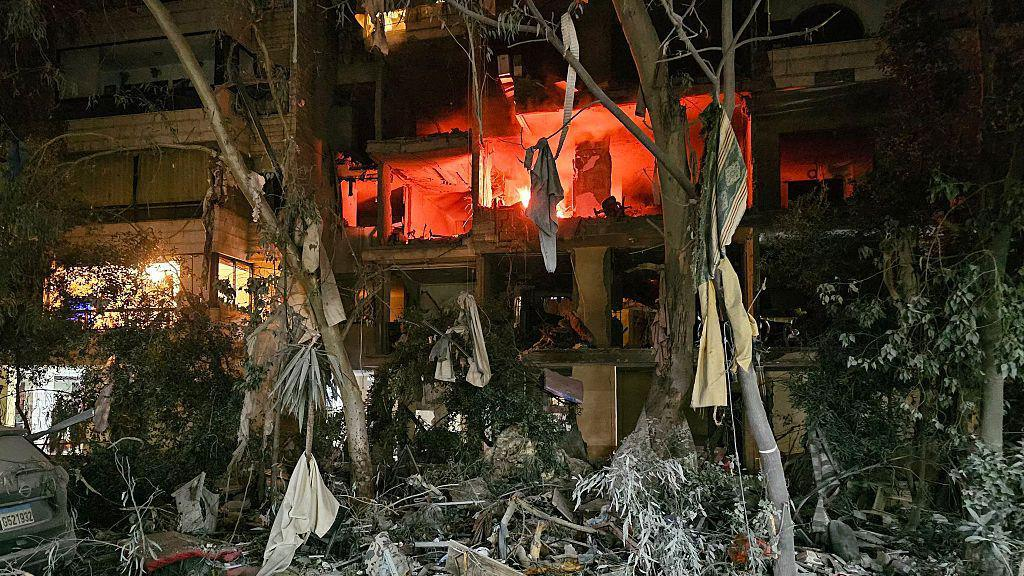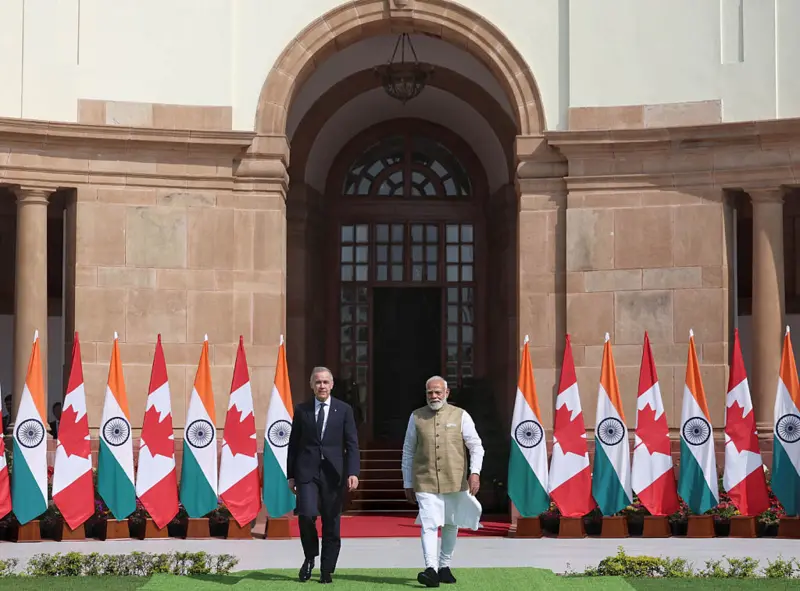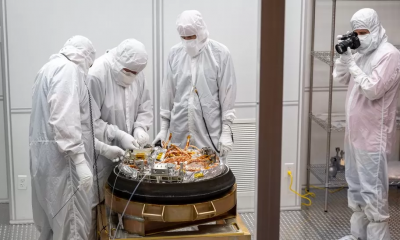Latest News
Osiris-Rex: Nasa awaits fiery return of asteroid Bennu samples

A seven-year mission to study what has been described as the most dangerous rock in the Solar System is about to reach its dramatic conclusion.
The Osiris-Rex spacecraft is bringing home the “soil” samples it grabbed from the surface of asteroid Bennu.
These dusty materials will be dropped off by the Nasa probe as it sweeps past the Earth on Sunday. They’ll be tucked inside a capsule to protect them from a fiery descent to the US State of Utah.
Scientists expect the samples’ chemistry to reveal new information about the formation of the planets 4.5 billion years ago, and possibly even to give insights into how life got started on our world.
Touchdown on desert land belonging to the Department of Defense is expected at 08:55 local time (14:55 GMT; 15:55 BST).
It is sure to be an anxiety-fuelled day for everyone involved in the Osiris-Rex project – especially during the 13 minutes it takes for the capsule to fall through the atmosphere.
The car tyre-sized container will be moving initially at more than 12km/s (27,000mph) and experiencing peak heating in excess of 3,000C. But a combination of a thermal shield and parachutes should bring it to a safe stop on the desert plain.
“We have spent an inordinate amount of time preparing for contingencies, everything that could go wrong, all the horrible things that we might encounter,” mission principal investigator Dante Lauretta told the BBC. “But the good news is we’ve practised and practised and practised and so we’re ready to go.”
The Osiris-Rex spacecraft left Earth in 2016 to investigate Bennu, which has a very slight chance of hitting our planet late next century. The probe took two years to reach the 500m-wide rock and a further two years observing the “space mountain” before making an audacious series of manoeuvres that obtained the cache of surface materials. All that remains is to bring those samples – about 250g (9oz) in mass – safely to the ground. The probe should release the capsule about four hours before re-entry is due to begin.
(BBC)
Latest News
PCB fines Pakistan players for underwhelming T20 World Cup campaign

All of Pakistan’s squad members from the T20 World Cup have been fined PKR 5 million (US$ 18,000 approx.) each by the PCB following their underwhelming campaign. Pakistan were eliminated from the tournament following the Super Eight stage, missing out on the semi-finals of an ICC men’s event for the fourth successive time – the first such instance in Pakistan’s history.
ESPNcricinfo has learnt that the fines are not for disciplinary reasons, but specifically for what the board deems poor performance at the event. They were imposed immediately following Pakistan’s match against India in the group stages, where a meek showing resulted in a 61-run defeat. They were further told the fines may end up being waived off if Pakistan reached the tournament semi-finals.
Pakistan did get to the second round, thus avoiding a third straight first-round exit, but ran into trouble in the Super Eight group after a washout against New Zealand was followed by defeat to England. New Zealand’s crushing win over Sri Lanka left them relying on other results and a huge victory over Sri Lanka to sneak into the last four. However, their winagainst Sri Lanka was much too narrow to prevent an early exit.
The PCB has come down hard on players in the past, though sanctions have generally been framed as disciplinary. ESPNcricinfo has learned there were no disciplinary issues within the team throughout the tournament, and the fines have been levied specifically for the quality of their on-field performances. That makes the sanctions handed out by the PCB particularly rare, and potentially unprecedented.
The current PCB administration, though, does have form for imposing punishments in the wake of disappointments at major tournaments. Five months earlier, following a narrow defeat to India in the Asia Cup final, the PCB had briefly suspended all No-Objection Certificates (NOCs) issued to players that would have allowed them to take part in T20 leagues through the winter. That suspension, though, was lifted soon after as some of the top players headed to Australia for the BBL.
While the fines will be imposed on all players, Pakistan did have players who enjoyed individual success at the tournament. Sahibzada Farhan broke the record for most runs at a T20 World Cup, and became the only player to score two hundreds at the same event.
[Cricinfo]
Latest News
Iran strikes Qatar and Saudi energy sites as US jets shot down by Kuwaiti ‘friendly fire’

New Iranian strikes have been reported on a major gas plant in Qatar and in Saudi Arabia, where an oil refinery fire is “under control”
The price of gas on international markets has risen sharply – at one point up 42%.
The US and Israel struck Iran on Saturday, killing the country’s Supreme Leader Ayatollah Ali Khamenei. The Israeli military has launched new strikes on Tehran, but the US defense secretary says there will not be “endless war”.
In Kuwait, several US fighter planes have crashed, in what the US military says was “an apparent friendly fire incident” – one plane plummeting to the ground was caught on film.
Meanwhile, the US says a fourth member of its military was killed in Iran’s initial attacks. – it did not say where
The Lebanese health ministry says Israeli attacks in Beirut and southern Lebanon killed at least 31 people – Israel says it was responding to Hezbollah attacks
And in Cyprus, two drones heading for a UK base were intercepted, after an earlier attack on Sunday.
[BBC]
Latest News
India and Canada agree series of deals as Carney and Modi reset ties in Delhi

India and Canada’s prime ministers have agreed a number of accords, including a long-term deal to supply uranium to India
After talks in Delhi, Mark Carney said he and Narendra Modi had agreed to conclude an economic partnership agreement by the end of this year. The two leaders are attempting to reset ties that have been strained since 2023 when then PM Justin Trudeau said there were “credible allegations” linking India to the killing of a Sikh separatist leader on Canadian soil
Under Carney, Canada has sought to rebuild engagement with India amid tariff pressure from its largest trading partner, the United States
On Monday, Modi and Carney also agreed to co-operate in areas like critical minerals, clean energy, space and higher education
[BBC]
-

 Opinion4 days ago
Opinion4 days agoJamming and re-setting the world: What is the role of Donald Trump?
-

 Features4 days ago
Features4 days agoAn innocent bystander or a passive onlooker?
-

 Features6 days ago
Features6 days agoBuilding on Sand: The Indian market trap
-

 Opinion6 days ago
Opinion6 days agoFuture must be won
-

 Features5 days ago
Features5 days agoRatmalana Airport: The Truth, The Whole Truth, And Nothing But The Truth
-

 Business6 days ago
Business6 days agoDialog partners with Xiaomi to introduce Redmi Note 15 5G Series in Sri Lanka
-

 Business5 days ago
Business5 days agoIRCSL transforms Sri Lanka’s insurance industry with first-ever Centralized Insurance Data Repository
-

 Sports7 days ago
Sports7 days agoCEA halts development at Mandativu grounds until EIA completion















